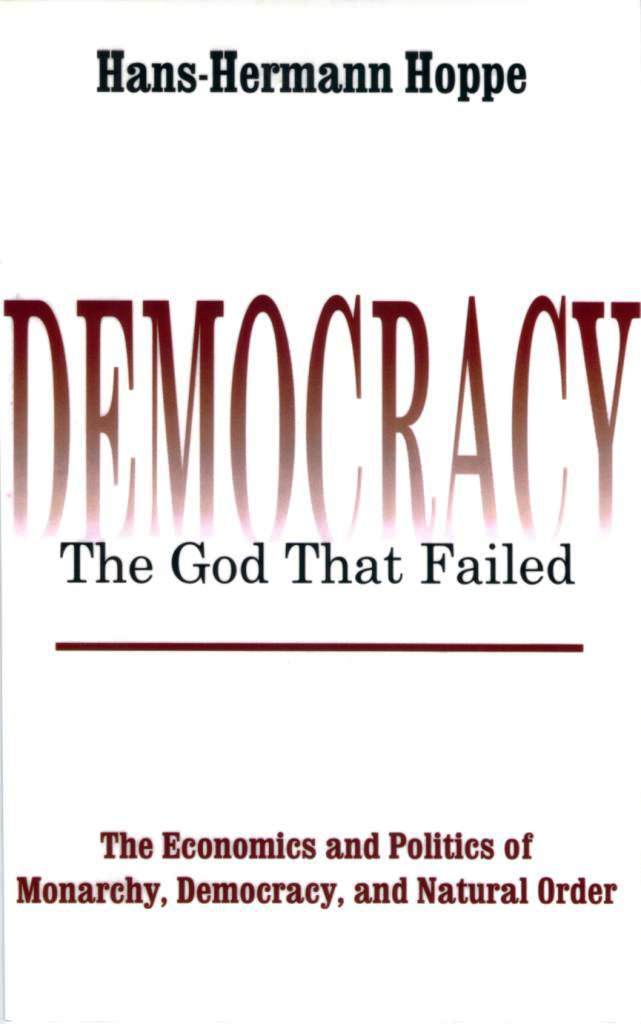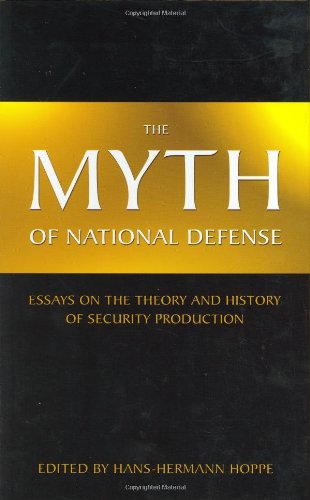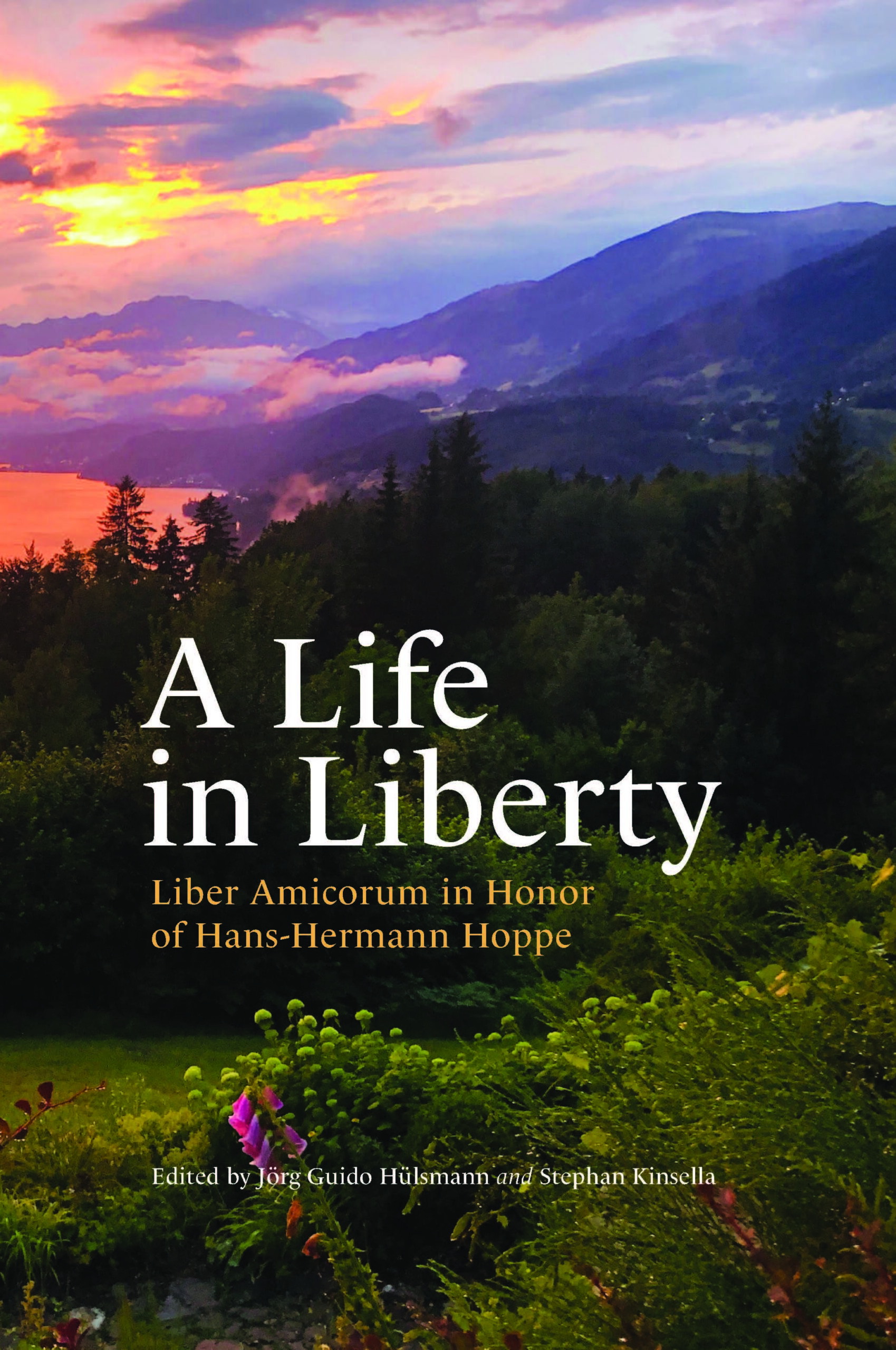Below is an edited version of the speech delivered at the 2024 Annual Meeting of the PFS (Sep. 22, 2024) (podcast at PFP288).
About Natural Order and its Destruction
Hans-Hermann Hoppe
I have touched upon quite a few different subjects in my intellectual work, but the central subject around which all of my work ultimately turned has been the subject of private property.
It has been my goal to demonstrate – not just to assert, to propose or to suggest – but to strictly, logically prove, that the institution of private property is (and always and everywhere has been) the foundation, or the necessary, indispensable requirement of peace (peaceful relations) among men (including women, of course, and anyone in-between) and, along with peace, then, of prosperity and, in one word, of human civilization.
Because every action requires the employment of specific physical means – a body, standing room, external objects – a conflict between different actors must arise, whenever two actors try to use the same physical means for the attainment of different purposes. The source of conflicts is always and invariably the same: the scarcity or rivalrous-ness of physical means. Two actors cannot at the same time use the same physical means – the same bodies, spaces and objects – for alternative purposes. If they try to do so, they must clash. Therefore, in order to avoid conflict or resolve it if it occurs, an action-able principle and criterion of justice or law is required, i.e., a principle regulating the just, lawful or “proper” vs. the unjust, unlawful or “improper” use and control (ownership) of scarce physical means.
Logically, what is required to avoid all conflict is clear: It is only necessary that every good be always and at all times owned privately, i.e., controlled exclusively by some specified individual (or individual partnership or association), and that it be always recognizable which good is owned and by whom, and which is not or by someone else. The opinions, plans and purposes of various profit-seeking actor-entrepreneurs may then be as different as can be, and yet no conflict will arise so long as their respective actions involve only and exclusively the use of their own, private property.
Yet how can this state of affairs: the complete and unambiguously clear privatization of all goods, be practically accomplished? How can physical things become private property in the first place; and how can conflict be avoided from the beginning of mankind on?
A single – praxeo-logical – solution to this problem exists and has been essentially known to mankind since its beginnings – even if it has only been slowly and gradually elaborated and logically re-constructed. To avoid conflict from the start, it is necessary that private property be founded through acts of original appropriation. Property must be established through acts (instead of mere words, decrees or declarations), because only through actions, taking place in time and space, can an objective – inter-subjectively ascertainable – link be established between a particular person and a particular thing. And only the first appropriator of a previously un-appropriated thing can acquire this thing as his property without conflict. For, by definition, as the first appropriator he cannot have run into conflict with anyone in appropriating the good in question, as everyone else appeared on the scene only later.
This importantly implies that while every person is the exclusive owner of its own physical body as his primary means of action, no person can ever be the owner of any other person’s body. For we can use another person’s body only indirectly, i.e., in using our directly appropriated and controlled own body first. Thus, direct appropriation temporally and logically precedes indirect appropriation; and accordingly, any non-consensual use of another person’s body is an unjust mis-appropriation of something already directly appropriated by someone else.
All just (lawful) property, then, goes back directly or indirectly, through a chain of mutually beneficial – and thus likewise conflict-free – property-title transfers, to prior and ultimately original appropriators and acts of appropriation. Mutatis mutandis, all claims to and uses made of things by a person who had neither appropriated or previously produced these things, nor acquired them through a conflict-free exchange from some previous owner, are unjust (unlawful).
Let me emphasize, that I consider these elementary insights argumentatively irrefutable and hence, apriori true. If you want to live in peace with other persons – and you demonstrate that you wish to do so by engaging in argumentation with them! -, then only one solution exists: you must have private (exclusive) property in all things scarce and suitable as means (or goods) in the pursuit of human ends (goals); and private property in such things must be founded in acts of original appropriation – the recognizable em-bordering or enclosure of scarce resources – or else in the voluntary transfer of such property from a prior to a later owner.
We can say, then, that these rules express and explicate the “natural law.” “Natural,” given the uniquely human goal of peaceful interaction; and “natural,” because these laws are “given” and merely discovered as such by man. That is, they are emphatically not laws that are made-up, contrived or decreed. In fact, all man-made (rather than discovered or found) law, i.e., all legis-lation, is not law at all, but a perversion of law: orders, commands or prescriptions that do not lead to peace but to conflict and hence are dysfunctional of the very purpose of laws.
This does not mean that with the discovery of the principles of natural law all problems of social order are solved and all frictions are to disappear. Conflicts can and do occur even if everyone knew how to avoid them. And in every case of conflict between two or more contending parties, then, the law must be applied – and for this juris-prudence and judgment and adjudication (in contrast to juris-diction) is required. There can be disputes about whether you or I have misapplied the principles in specific instances regarding particular means. There can be disagreements as to the “true” facts of a case: who was where and when and who had taken possession of this or that at such and such times and places? And it can be tedious and time-consuming to establish and sort out these facts. Various prior-later disputes must be investigated. Contracts may have to be scrutinized. Difficulties may arise in the application of the principles to underground resources, to water and to air, and especially to flows of water and air. Moreover, there is always the question of “fitting” a punishment to a given crime, i.e., of finding the appropriate measure of restitution or retribution that a victimizer owes his victim and of then enforcing the verdicts of law.
Difficult as these problems may occasionally be, however, the guiding principles to be followed in searching for a solution are always clear and beyond dispute.
In every case of conflict brought to trial in search of judgment, the presumption is always in favor of the current owner of the resource in question and, mutatis mutandis, the burden of a “proof to the contrary” is always on the opponent of some current state of affairs and current possessions. The opponent must demonstrate that he, contrary to prima facie appearance, has a claim on some specific good that is older than the current owner’s claim. If, and only if an opponent can successfully demonstrate this must the questionable possession be restored as property to him. On the other hand, if the opponent fails to make his case, then not only does the possession remain as property with its current owner, but the current owner in turn has acquired a lawful claim against his opponent. For the current owner’s body and time was misappropriated by the opponent during his failed and rejected argument. He could have done other, preferred things with his body-time rather than defend himself against his opponent.
And importantly also: the procedure to be selected for dispensing justice along the just indicated lines is clear and implied in the very goal of peaceful, argumentative conflict resolution. Because both contenders in any property dispute – John and Jim – make or maintain opposite truth claims – I, John, am the lawful owner of such and such a resource versus no, I, Jim, am the lawful owner of this very same resource – and hence, because both, John and Jim, are interested, partial or biased in favor of a particular outcome of the trial, only some disinterested or neutral third party can be entrusted with the task of dispensing justice. This procedure does not guarantee that justice will always be done, of course. But it assures that the likelihood of unjust verdicts is minimized and errors of judgment most likely and easily be corrected. In short, then, for each and every property dispute between two (or more) contending parties it must hold: No party may ever sit in judgment and act as final judge in any dispute involving itself. Rather, every appeal to justice must always be made to “outsiders,” i.e., to impartial third-party judges.
We may call the social order emerging from the application of these principles and procedures a “natural order,” a “system of natural justice,” a “private law society” or a “constitution of liberty.”
Interestingly, although the prescriptions and requirements of a natural order appear intuitively plausible and reasonably undemanding on its constituent parts, i.e., on us as individual actors, as a matter of fact, however, we inhabit a world that significantly deviates from such an order. To be sure, everywhere and at all times there are some traces of natural law and justice left and to be found in civil life and the handling of civil disputes. No society rejecting all of natural law, in its entirety, could ever survive. But the extent to which natural law is preserved – or the degree of deviation from natural law – is and has been significantly different from one place and one point in time to another; and accordingly, some societies are or have been more successful: more civilized, more peaceful and prosperous than others.
This brings up the question as to the cause or causes of such distortions or deviations from natural law – or, as we may say: of de-civilization.
The ultimate error or mistake responsible for such deviations – the “original sin,” if you will – is the institution of a monopolist on the use of force or violence. Without such a monopolist, without a State as this monopolist is conventionally called – and this is what we are typically told in school and university and what most people actually and habitually believe – there would and could be no peaceful social cooperation among man but “anarchy” would instead break out, i.e., some never-ending war of everyone against everyone else.
But this belief is not only empirically wrong, just look around, it is a big lie. That is, the belief is not just an innocent error but an error deliberately spread for the promotion of un-lawful purposes (with evil intentions).
The institution of a monopolist on the use of violence implies that the earlier-mentioned natural law procedure and method of conflict-resolution through independent third-party arbitration, i.e., that no party may ever sit in judgment and act as final judge in any dispute involving itself, is abandoned. A monopolist of ultimate decision-making (beyond which no further appeal is permitted) is precisely that: a judge sitting in judgment of conflicts (disputes) involving himself.
However, any such institution cannot and does not help eliminate or minimize conflict – as is the purpose and objective of natural law – but, to the contrary: it will increase and widen the range of conflict. Whoever or whichever institution has a territorial monopoly on the use of violence can and will predictably not only be biased in his own favor in any actual dispute with some other, private party, but a monopolistic agent or agency can and will also provoke, initiate and cause conflict with other people and their properties or possessions – and then declare such interferences with and impositions on other people and their holdings as justified and lawful.
It is easy to see, then, why the role or function of a monopolist of violence might be attractive to some people. It allows an actor or agency to live off and enrich itself at the expense of others. It allows them to improve their own well-being and social standing not by having to go through the trouble of producing or selling something or of acquiring something from others through mutually agreeable exchange, but, seemingly effortless, by mere unilateral decree, verdict or say-so.
And in light of this it is also easy to understand why every prospective founder of a State and every current (principal) State-agent would want to promote the very belief in the State’s necessity for the establishment and maintenance of peace and civilization – even if they were to recognize themselves that this belief is false. Because this belief is a necessary lie, if it is your or your agency’s goal to live off and rule over other people, i.e., to exercise power.
The principal method for the exercise of power, then, is legislation, i.e., the making-up of laws (rather than their discovery). “Natural” law is replaced by man-made “positive” law, i.e., by “laws” made-up to modify, twist, circumvent, pervert or replace “natural” law provisions to its (the State’s) own advantage and favor.
Characteristically, so as to give special affirmation to its status as ultimate judge, then, there is legislation to the effect that State-agents qua State-agents are exempt from any and all liability. Indeed, in declaring itself and its agents exempt from personal liability for any damage or debt caused or incurred by them in the line of duty, any remaining inhibition against the exercise of power vis-à-vis others is soothed. Increasingly and without much hesitation more and more costly, frivolous and risky impositions to the detriment of others and their property – yet to the monopolist’s own advantage in terms of its own possessions (or holdings) and his range of control over the holdings of others – will come to be written into law (be legislated).
In principle, as ultimate judge exempt from all liability one can decree that everything and everyone on a given territory be subject(ed) to legislation. By decree he could tax, burden, prohibit or punish whoever and whatever he wants. Every activity can be regulated – punished or rewarded – by legislated law. Literally nothing remains outside the purview and reach of legislation.
We, here and now in the so-called Western World, have not yet reached this point of total State-control. But in legislating nowadays everywhere even speech and words by means of officially sanctioned speech codes and thought controls, we have obviously already come a long way toward totalitarian rule.
It has taken a long time for the Western State to reach this point in its pursuit of power (control over others and their property and possessions). And let me note here only in passing the instrumental role that in particular the institution of democracy (popular elections, majority rule, free entry into State-government) has played in the growth of State power. I have written a book on that subject. [Democracy: The God That Failed (Transaction, 2001)] Suffice it to say here that the expansion of State power has proceeded incrementally, one step after another, and that for a very long time. Every step on this path, from the initial establishment of a territorial monopoly of violence on forward to the present, has met some degree of opposition or resistance. Because, by definition, every expansion of State power implies an increased range of control over other people and their holdings and, in reverse, a correspondingly diminished range of control of others regarding their present holdings. Every State decree, every new piece of legislation, then, generates some victims, some people whose control over something is reduced or stripped away as a consequence, and who are accordingly opposed to such legislation.
The State, then, in order to expand and grow, must learn how to overcome – to break, to reduce, to silence or to eliminate – any such opposition and resistance.
As a look around the present world amply demonstrates, Western States have made enormous strides in this endeavor of stifling any opposition. All presently living people have been brought up and socialized in the environment of a “mature” State and learned how to live with and put up with it. Private property rights have been eroded and curtailed to its mere barebones. Decrees regulate in the minutest detail what you may or may not do with your private property: what and how to produce, what and how to consume, what to sell and buy (or not); how to build, equip, furnish, heat or cool your own house or factory; how and how not to transport and travel by bike, car, train and plane; what to eat and drink, how to regulate your own family and business affairs and how to raise your own children; what to say and what not, how to address another person and, last but not least, what to keep of your own property and what to hand over to the monopolist – and yet, there is little if any opposition or resistance to such increasingly invasive regimes.
And whatever little opposition there is, it is mostly of the verbal kind and only rarely (if at all) rises to the level of active resistance. Most people have made their arrangement with the State. Some work as State-employees, and some are beneficiaries of State favoritism, funds and money. They tend to make no big fuss so as to keep their favors, jobs or subsidies. Others have simply given up (resigned) and, out of habit, more or less quietly submit to State-orders in order to stay out of trouble. And as for the verbal opposition, which certainly exists, it is almost invariably directed at the wrong target, and hence ultimately ineffective and “harmless” from the State’s viewpoint qua monopolist of violence.
All criticisms are directed at specific people or the operation of some specific department (office) within the larger, overall State-administration and -apparatus, and the suggested solution is always the same: a change of personnel or a change in the organization-structure of State-government. That certain functions or the institution of a State itself may be the source of a problem and accordingly should be abolished (eliminated) rather than “reformed,” appears unthinkable. Even the seemingly fiercest critics of State government, then, ultimately turn out to be State apologists. Indeed, they resemble those critics of socialism (of the old, Soviet style) that explained – and excused – the socialist regime’s apparent failures by pointing to the “wrong” personnel in charge. With Trotsky, Bukharin or X, Y or Z in charge instead of Stalin, socialism would have turned out rosy.
In the same vein, then, critics of the present Western Welfare State model always point to some specific personnel or internal organization as to the reason for any apparent trouble and failing. And indeed, the current crop of politicians in control of a State-apparatus – the ruling class – offers abundant room for criticism. Wherever you look, from the USA, as the premier and most powerful prototype or model of the (democratic) Western State to Great Britain, to continental Europe, and in particular to Germany, as well as the former European colonies of Canada, Australia and New Zealand, everywhere a similar picture of some stupendous, all-around incompetence emerges. Everywhere, the mass of people, millions upon millions, is ruled by a small bunch, of only a few hundreds or thousands, of professional failures and losers, empty suits, megalomaniacs, narcissists, propagandists, sycophants, liars, crooks, clowns, plunderers and murderers. No wonder, then, that there is one scandal after another to be observed, day in and day out, and hence always plenty of crazy “stuff” to report on and complain about and criticize. And no wonder that the ruling class is widely despised by a sizable numbers of people. It is hard to swallow being ruled and commandeered around by a bunch of “know-nothings” and “can-nothings,” of morons and imbeciles. Many people feel simply insulted by (and are annoyed about) the mass of incompetence, of ignorance and arrogance, encountered in their dealings with State-power.
But to believe, as practically all current critics of the Western (democratic) system do, whether knowingly or not, that these endless scandals and annoyances could be avoided if only the current personnel in charge of the State-apparatus were replaced by some other, “better” people is naïve and fundamentally mistaken.
The institution of a State attracts, breeds and promotes certain characters and character traits. From the outset it attracts the power-hungry, those who want to rule over other people and dominate their conduct, and on the other hand, as its psychological complement, it attracts the servile, those who desire to hang-on to, serve and submit to the powerful in exchange for personal security, protection and privilege. And these (less than desirable) character traits of power-lust and servility, then, are systematically bred, strengthened, promoted, stimulated, cultivated, refined and diversified by entering the State apparatus and working within and as part of a State. This is what “power corrupts” actually means. It makes the power-hungry even more hungry, and in tandem with the growth of (State) power ever more room is opened up also for the growth and development of servile hangers-on. The result of this is the mentioned all-around incompetence in all of its unpleasant aspects and variations.
To believe, then, that the substitution of one person or one bunch of people exempt from responsibility and liability by another such person or bunch of people can be a solution to any “social problem” is simply an illusion. Power corrupts and it corrupts everyone and everywhere. And as long, then, as the critics of the present Western State restrict their criticism to the failings of specific State agents or agencies and merely demand their replacement or reorganization by some other such agents or agencies we are doomed and the march toward totalitarian control is bound to continue.
That we are ruled by incompetents, ignoramuses, fools, morons, imbeciles and scum, and that this scandalous and deplorable state of affairs has not improved but gotten worse over time is no accident. It is the predictable, logical consequence of accepting the original myth regarding the necessity of a State – of a monopolist of violence, a final and ultimate judge who, unlike everyone else, cannot be summoned by anyone to be put on trial for his actions – for the maintenance of peace.
In fact and to the contrary, it is scandalous and a moral outrage that anyone should rule (dominate) anyone else. That one person could take another’s “natural property” (lawfully acquired property, per “natural law”) and command him around without requiring his consent and even against his open protestation. And that this one person then should be immune from any and all external accusation, counter-claim or “legal” challenge.
This is a blatant violation and perversion of natural law: and any such person is not a law-abiding actor, but instead a criminal, an outlaw.
Even more mind-boggling, scandalous and outrageous, then, that one man or one small bunch of people (however “good” or well-intentioned) could rule over hundreds, thousands or even millions of people and their property and possessions, none of whom the rulers personally know or have ever met and none of whom has ever consented to any such treatment. These rulers are not just outlaws, they are gangs of outlaws, of habitual liars, rip-off artists, cheats and frauds, hard-core criminals and repeat offenders. Summoned before a court of natural law they all would be confronted with countless accusations and be sentenced to restitution, compensation and punishment, driving them into personal bankruptcy and economic ruin.
The current, seemingly interminable march toward increasingly totalitarian rule by a small ruling class to be observed throughout the Western world can only be stopped and reversed, then, if the institution of the State itself comes under criticism and is recognized as a mighty criminal enterprise, without any legitimacy whatsoever, and run by people that are anything but “honorable” (as they themselves like to be considered), if not outright despicable.
Using Pareto’s famous 20-80 principle as guidance, then, one may predict (speculate) when – if ever – this spook will come to an end and the State will begin to crumble away. Of all current and upcoming public State-critics, i.e., of public intellectuals, journalists, commentators, etc., some 20 percent need come to recognize and be willing to say so and expose the State as a predatory enterprise and a moral monstrosity. To this end, it would be helpful, for instance, if out of the sizable number of current “constitutionalist” or “minimal-Statist” State-critics a substantial portion could finally bring themselves to admit to the logical inconsistency and intellectual bankruptcy of their own doctrine and consequently openly convert to private property anarchism and natural law. Presently, no matter how radical their State-criticism may appear, they ultimately turn out harmless State-apologist. Then (afterwards), as exponents of a private law society without State, they expose and de-legitimize the State as an illegitimate institution and their “enemy” – which, however, requires not only insight but also courage, because such a stance is viewed by the State as “dangerous” and may trigger some repercussion or retaliation.
And this sizable minority of public intellectuals (in the widest sense of this term), then, must in turn bring about 20 percent of the general public of a given (State-) territory to similarly see the State as a mighty criminal enterprise – to fear, but also to expose and ridicule and to scoff and laugh at, owing to the all-pervasive incompetence, arrogance and pretentiousness of its leadership, demonstrated in everything it does and says.
Once this is achieved – but only then, if we are to believe the Pareto principle – has the de-legitimation of the State progressed far and deep enough that it may begin to crumble, or to wither away, in Marxist terminology, and disintegrate or decompose into its smaller, local constituent parts or components.
Needless to say that we are still far away from this goal and much work still lies ahead of us.












Comments on this entry are closed.